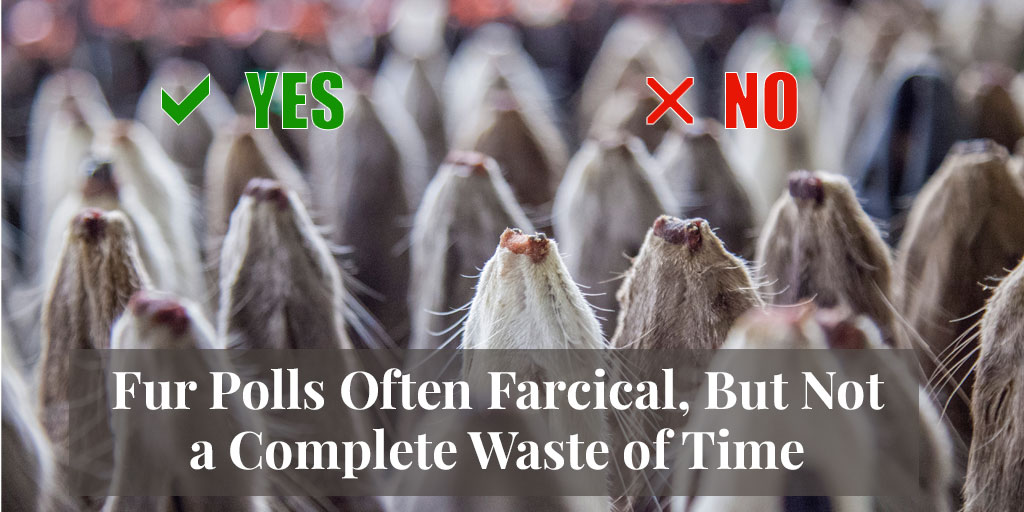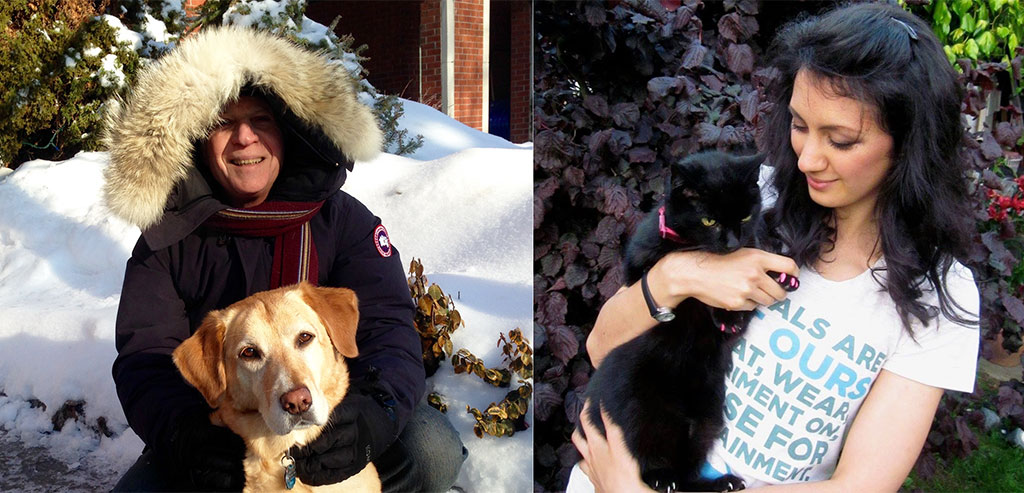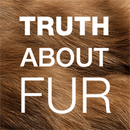
The value of on-line polls about fur is debatable, but Truth About Fur will keep playing along. The time required to vote is minimal, we’ve yet to hear of any poll being used for malicious purposes (like phishing), and while fur polls are certainly not life-changing, they may be beneficial.
In case you’re unfamiliar with how most of these polls work, a typical one starts life as follows. The owners of Website X decide to launch a poll to generate more traffic for their site. Their motive for doing this can vary; maybe they want to make more money from advertising, or increase their ranking in Google searches. Remember, though, that the last thing on their minds is what you think. They don’t care. All that matters is that you vote, and that you get all your friends to vote too.
So they pick a divisive subject like, “Do you agree with wearing fur or not?” with the potential to generate lots of knee-jerk votes. They then kick back and wait to see who finds their poll, hoping it will be both pros and antis.
If PETA et al. find it first, they spread the word, and votes opposed to fur come flooding in. The fur trade then gets wind, and starts voting to try to get their side of the story across. Pretty soon, a full-scale voting war is under way, and the owners of Website X congratulate themselves for a job well done. They then launch a new poll on whether marijuana should be legalised, or Taylor Swift’s hair looks better short or long.
There are variants on this theme, of course, like posting positive or negative reviews on a business’s Facebook page to affect its star rating. Such was the experience of a Vancouver restaurant in 2017 when it added seal meat to its menu. It was immediately bombarded with one-star (lowest possible) reviews from around the world by animal rights activists, and its rating plummeted. Friends of sealing then countered with positive reviews, even though, like the animal rights activists, most had probably never visited the restaurant. It was a farce, but what else could one do? (The only other defence for a business targeted by activists is to disable its review function, at least temporarily.)
Possible Benefits
So why does anyone vote in such polls, post fake reviews, or whatever? Should we even bother? Well, here are some possibilities – though as I said at the start, they’re all up for debate.
• There’s always a chance, however slim, that policymakers, the media, “influencers”, or even Joe Public will be swayed by the results. Obviously a poll on a major website like CNN, for example, is more likely to have a far-reaching impact than one on a website no one’s ever heard of. But then maybe it’s an issue of local importance that’s being polled, so if you live in Smallville, take a poll on Smallville.com seriously.
• The quality of the question is also a factor. If it’s just “Do you like fur, yes or no?”, you may take it or leave it. But if it’s more specific, like “How do you feel about a proposed fur retail ban in [name city here]?”, it may be seen by some as a measure of public sentiment, especially if voting is restricted to city residents, for example by only allowing voting by subscribers to the local on-line paper.
• A “win” for fur serves to remind everyone, including opponents, that the fur trade is alive and kicking. Conversely, a “loss” could be cited as “proof” that society has turned against fur — a “fact” that animal rights groups will be quick to repeat in their next letters to editors or lawmakers.
• On a more positive side, polls provide an opportunity for supporters of fur who don’t normally engage in PR or lobbying to “get involved”. Just clicking on Yes or No may not seem like much, but it could be argued that it’s as legitimate an “action” as voting in government elections. Your lone voice may seem inconsequential, but 10,000 lone voices can be very consequential.
Real-Life Example

So with that said, here’s a real-life example for you to cut your voting teeth on, if you haven’t already done so. A Paris-based website called The Rift is currently running a poll, in both English and French, asking “For or against animal fur?” or “Pour ou contre la fourrure animale?”. This website specializes in presenting two sides of controversial issues, and also distributes a paper version to universities in the Paris region. To make things more exciting, and hopefully educational, readers are asked to express their opinion on fur twice, before and after reading the short (400 words) opposing arguments from a PETA spokeswoman and Truth About Fur’s very own Alan Herscovici. It takes just two minutes to make your voice heard. Or make that four minutes and vote in the French poll too. (Hint for those who don’t speak French: “Oui, je suis pour la fourrure animale” means you like fur!) As of this writing, fur fans are far in the lead in the English vote, but fighting it out neck-and-neck in French, so your vote here matters!
The PETA spokeswoman’s essay will make frustrating reading for anyone with real knowledge of the fur trade. For example, she repeats the completely false activist claim that a World Bank report found fur dressing to be one of the most polluting industries. As documented by Truth About Fur, it is easily verifiable that it was, in fact, leather tanning that was cited as a pollution risk in that report. (Fur dressing is a completely different process that uses alum salts and other benign chemicals.) She also repeats the nonsensical claim that female coyotes struggle to return to their “starving pups”, although trapping occurs in the fall and winter when fur is prime – in other words, at a time when the young of the year are already independent. Knowledgeable people may want to correct these (and other) urban legends by posting comments in the Readers’ Debate.
It has taken a while for fur folks to learn to play this game, probably in large part because animal-rights supporters tend to be younger, and spend more time on-line. Trappers and farmers are often outdoors, far from computers! They are also people who tend to prefer quietly doing their work, not engaging in debates. Sometimes, however, you have to make an effort to speak out for what you believe.
So, yes, the on-line world of opinion polling certainly seems like a farce sometimes, but hundreds and often thousands of votes are cast in fur polls, so some people clearly take them seriously. You’ve nothing to lose by taking part, and may actually benefit – even if we’re not sure exactly how. One thing is certain: if people with real knowledge of the fur trade do not participate in these discussions, we can’t expect the public to understand our side of the story!
***
To learn more about donating to Truth About Fur, click here.











Hunters and trappers take coyotes year round in some states, leaving abandoned pups, so the animal rights people were right about that, and you were wrong. Coyote hunting can be useful to landowners, but it can also be excessive, to say the least. I’m not looking to argue the necessity of that here, however, hunters and trappers definitely leave abandoned pups, with pleasure. Only in recent years have wildlife managers begun to appreciate and understand the coyote’s role in the environment, but the old school hunters have resisted the (often unofficial) newer guidelines and fair chase ethics.
Last warning, Adam 🙂 I’m publishing this comment only because you get touchy when I ignore you. This comment of yours has absolutely NOTHING to do with our blog post. Keep your comments relevant or they will go straight in the trash.
Be fair! It was totally relevant. In reference to an argument about PETA, who said that pups are abandoned by trappers, this article reads “trapping occurs in the fall and winter when fur is prime – in other words, at a time when the young of the year are already independent. Knowledgeable people may want to correct these (and other) urban legends”
Let’s be precise here. You said that “hunters and trappers definitely leave abandoned pups, with pleasure.” Of course, the “with pleasure” part is all you, with no factual basis. But the fact is that Truth About Fur represents the fur trade, and trappers who are doing it for fur do not trap when pups are still dependent on their mothers, period. There are a few reasons for this such as ethics and conservation, but the easiest one for you to grasp is perhaps economics. Furbearers’ pelts are prime in winter, while they bear their young in the spring when their pelts are far less lush and worth far less too. This is reflected in trapping seasons, which every state has. If you buy a parka trimmed with coyote fur, I can absolutely assure you that the coyote was trapped in winter. If a trapper were to try to sell the pelt of a coyote caught in spring or summer, the price he’d get – if he even found a buyer – would not cover the price of his gas.
btw here are some other places where to express some pro-fur statement 🙂
https://www.debate.org/opinions/should-people-wear-animal-fur and https://www.debate.org/opinions/should-animal-fur-be-used-for-clothes
I believe fur use will stay in fashion because the anti-fur campaign is fully based on nonsense and lies. Facts don’t seem important in today’s word, but I hope, we fur wearers aren’t so weak that we couldn’t ¨defend our rights. Fur is just one form how we use animals legitimely. So long as we eat meat, wear leather, down, wool etc and use animals for medical research, fur will have its place in fashion. Environmental benefits of fur trapping are unquestionable. Most people know real fur is much better than synthetics, but can’t proclaim it in the momental anti-fur atmosphere. The anti-fur attitude is today’s “fashion”, but it must change. The pro-fur activities, like yours, can contribute!
I’m a fur fan, but I think over time fur will continue to come under attack. For some reason, people equate meat and leather as “necessity and by-product” whereas, with fur, it is seen as ego and unnecessary. Suffering animals. Whereas meat, which involves killing animals, is seen as part of life and a choice. So, I see leather as continuing to be acceptable as a fashion choice, whereas fur will increasingly be seen as an unnecessary and selfish choice. Unless something productive is done with the carcasses of fur-bearing animals, I think fur will gradually be outlawed worldwide, sadly. Pure emotion.
That’s definitely a factor, Robert. Food always seems to trump clothing, and even though mink and fox farmers nowadays make full use of the carcass for oil, biofuel, fertliser, crab bait, etc., humans are just not keen on eating them. That said, there are a host of wild furbearers that make great eating. See here: https://truthaboutfur.com/top-5-tasty-furbearers-muskrat-stew/ And right after we finished this piece, a lot of folks wrote to say cats like mountain lion and lynx are especially tasty.